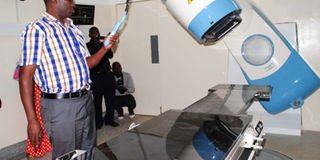Prime
Ugandan officials train in radioactive waste handling

A technician explains how the Cobalt 60 radiotherapy machine works. The machine is one of the generators of radioactive material. FILE PHOTO
KAMPALA- The Atomic Energy Council (AEC) has started training their staff and key players in the sector to equip them with skills required to transport radioactive substances within the country.
The AEC Chief Executive Officer, Mr Noah Deogratias Luwalira, described radioactive substances as those materials that emit ionising radiation. Examples include uranium, thorium and potassium, among others.
“The training is aimed at boosting capacity of the people who are supposed to ensure nuclear security of radioactive materials in transportation. Our people don’t have basics yet we have to transport these materials from one place to another,” Mr Luwalira said yesterday at the sidelines of the ongoing training in Kampala.
He said the energy council regulates the peaceful applications of ionising radiation to provide for the protection and safety of individuals, society and the environment from the dangers resulting from these materials.
Dangers of exposure
He said exposure to high doses of radiation from generators predisposes individuals to chronic diseases including cancer or even sudden death in rare cases of extreme exposure.
He added that small amounts of radiation can cause diseases that are not so serious but develop over the course of time. Other adverse effects include damage of the central nervous system, radiation skin burns, and cataracts.
“To avoid such consequences, we observe what we call Alara principles,” Mr Luwalira said.
Alara, according to Mr Luwalira, is an acronym used in radiation safety for “As Low as Reasonably Achievable.” It is based on the minimisation of radiation doses and limiting the release of radioactive materials into the environment by employing all reasonable methods.
The training has attracted government officials from security agencies such as the Uganda People’s Defence Forces, traffic police and AEC to boost their capacity in responding to emergency scenes.
He said radioactive materials have a potential of being targeted by unscrupulous individuals who might use the nuclear material for explosive devices.
Mr Joshua Birungi, a radioactive protection officer at AEC, described nuclear security as a measure relating to the prevention and detection of, and response to theft, sabotage, and unauthorised access and illegal transfer of nuclear material and other radioactive substances.
Between 2003 and 2007, he said, some radioactive substances were stolen from Mulago hospital.



